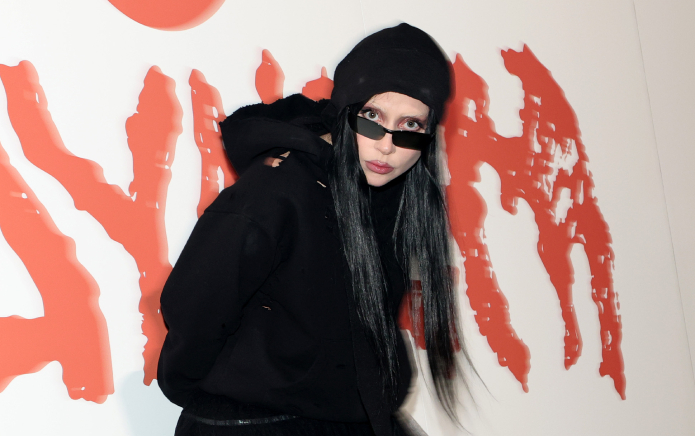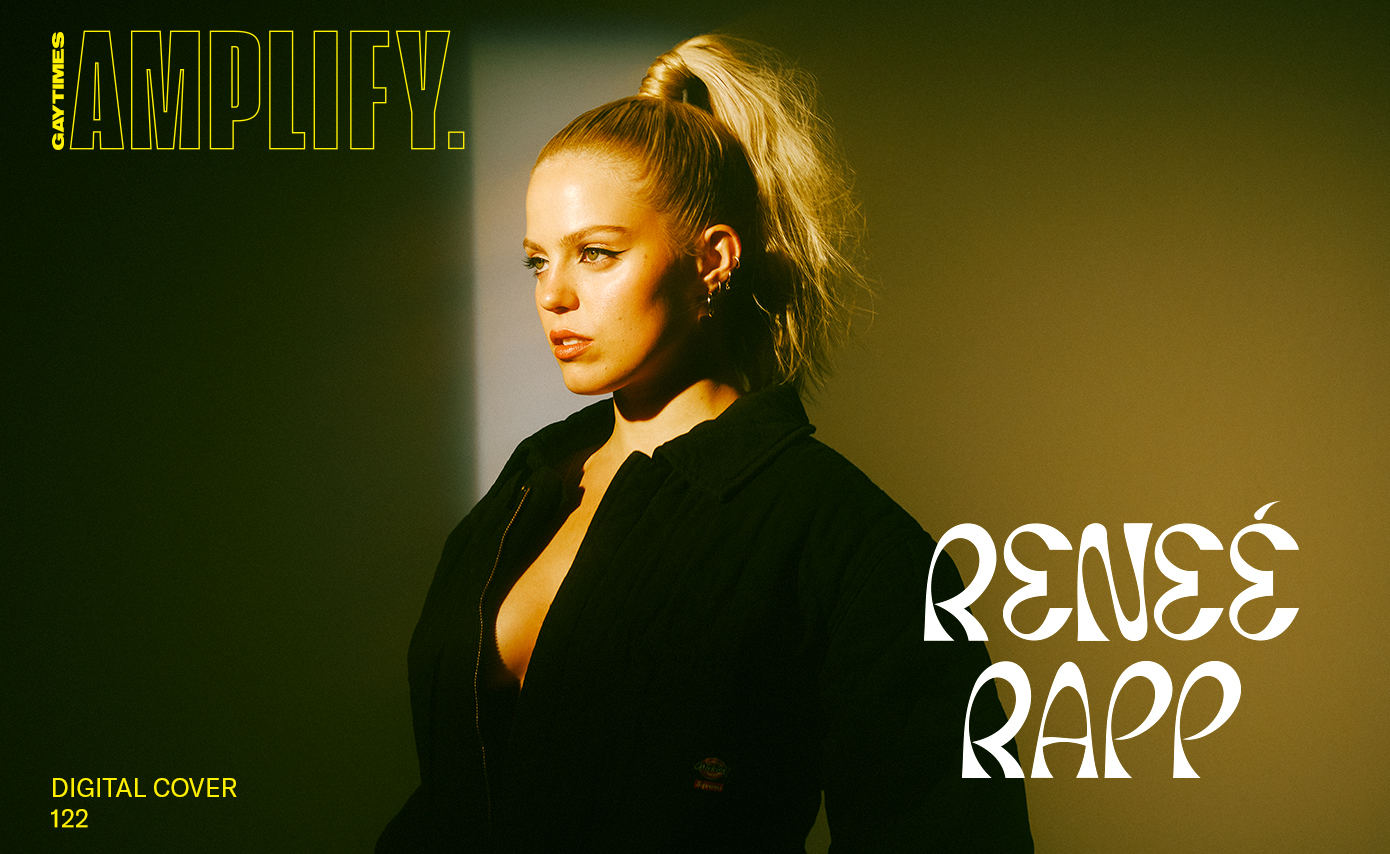
Reneé Rapp really doesn’t fucking care, not anymore. The 23-year-old artist is lounging in a swanky high-rise London office room, donning a sand-coloured Ganni jacket, as her Pret vanilla oat latte order comes through. “I’m trying to get my shit together,” she confides, smiling. Rapp’s quick-fire humour is a far cry from the queer heartbreak and coming-of-age realisations lamented in her debut EP, Everything to Everyone, but hints at how switched on the young rising star is. And as the singer-songwriter’s string of accolades – a National High School Musical Theatre award at 18 to making her Broadway mark a year later – have proved, her prolific turn is hard-earned and, well, unstoppable.
On her seven-track release, Rapp mixes emotively charged ballads and powerhouse tunes as if she were creating a fan-curated playlist; pleasing, playful, and making a point. Topline track Too Well is a sparkly, dainty pop beat with forward-first melodies, while banger-meets-ballad In The Kitchen takes a leaf out of Frank Ocean’s book, hoping to leave you reeling and devastated. However, Rapp’s on-the-scene arrival doesn’t end just there. As one of the leading faces of HBO’s cult TV series Sex Lives of College Girls and a notable name reprising the musical role of Mean Girls’ Regina George, Rapp is showcasing her talents as a triple threat, while proving her worth isn’t measured by how of herself she can give away.
Above anything else, Rapp considers herself a musician. “I don’t feel as confident when I act or when I’m doing Broadway. It scares the shit out of me. I don’t want to be seen as an actor — I want to be seen as a musician,” she tells GAY TIMES. And, listening to Rapp’s tracks – released or not – it can feel like you’re eavesdropping on a confessional conversation. “Your boyfriend’s in the bathroom and I’m holding your hand / I wonder if he notices the things that I can,” she sorrowfully sings on What Can I Do, her first-ever queer song. While Rapp’s solo project only landed late last year, the North Carolina actor made a habit of maintaining career paths that never strayed too far from the music industry. “Music is what I love and gravitate toward most. Once I knew what I wanted to do, I never thought I would act in this capacity,” she shares.
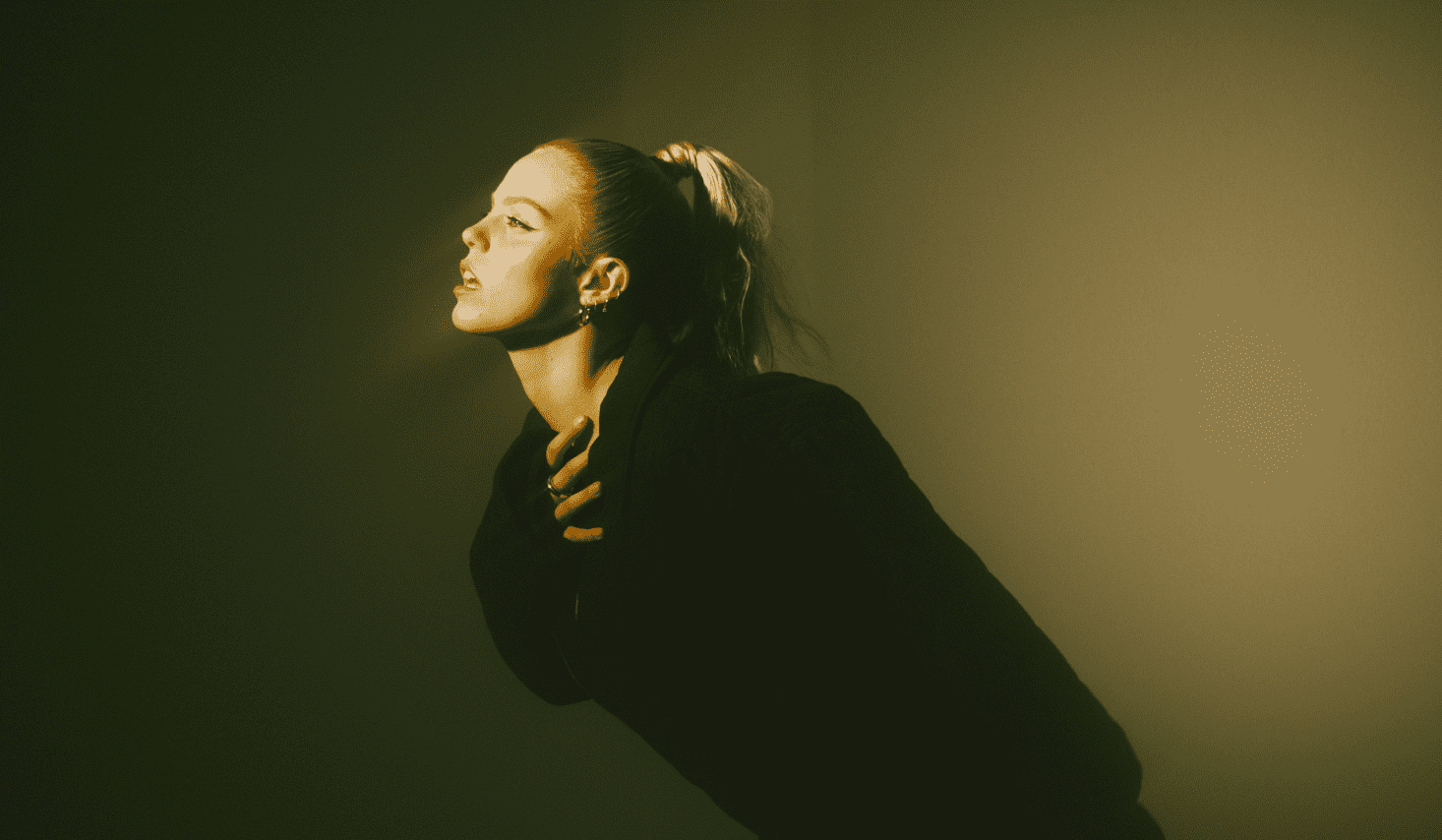
Growing up in the Hollywood machine, Rapp set her targets early, particularly the dream of becoming the next global trailblazer. “I’m a very goal-oriented person, so when something didn’t fit into the mould of wanting to be Beyoncé by 18, I was really overwhelmed,” she says. While Rapp hasn’t quite retraced the steps of the Texan superstar, the singer has begun to make waves of her own. Stepstoning across Broadway, TV to music, with the support of her “good team”, the 23-year-old has begun using the industries around her to realise her dream. “I’ve been very judgmental of any moves that I’ve made career-wise, and recently I’ve learned to trust the people around me who don’t make me feel like shit, because I’ve definitely had my run of the mill of that.”
Rapp’s quick succession through the industry might seem like a stroke of luck, but it has been anything but. Although, she says, it has made her feel a little “spoiled”, a word that regularly crops up in our conversation. “I’ve been putting out music for six months and none of it is probably going to soak in for the next year of my life,” she half-shrugs. “I try, but I buckle down, and go. During my first-ever show in LA, I felt really really good about it. Sometimes it sinks in, sometimes it doesn’t — I’ll see it all over Twitter, it’ll be fine!”
And, inevitably our conversation teeters towards social media. A subject that would make most artists squirm, Rapp graciously accepts the change of pace. “Babe, that’s my favourite thing ever. Don’t you worry,” she reassures. In today’s age, if you have plans of becoming a big-name artist, there’s a good chance you’ll have to sign your soul away to the internet. Fortunately, for Rapp, she has a knack for going viral online. With 1.2 million followers on TikTok, the singer’s account serves as a masterclass of peak Gen Z humour, meme-ified promo reels and queer culture at its best. And, to no surprise, that’s exactly where a couple of Rapp’s most beloved tracks (Too Well and Colorado) have taken off, rivalling one another as fan favourites. “My favourite track is In The kitchen. But I understand the Colorado and Too Well debate, because, I actually agree with you, I hated Too Well up until a few weeks ago,” Rapp laughs. “The second I recorded it, I told everybody on my team, ‘This song will never come out’, verbatim. Then, three days before the project was put together, my letter to my A&R was: ‘You better make me like this.'”
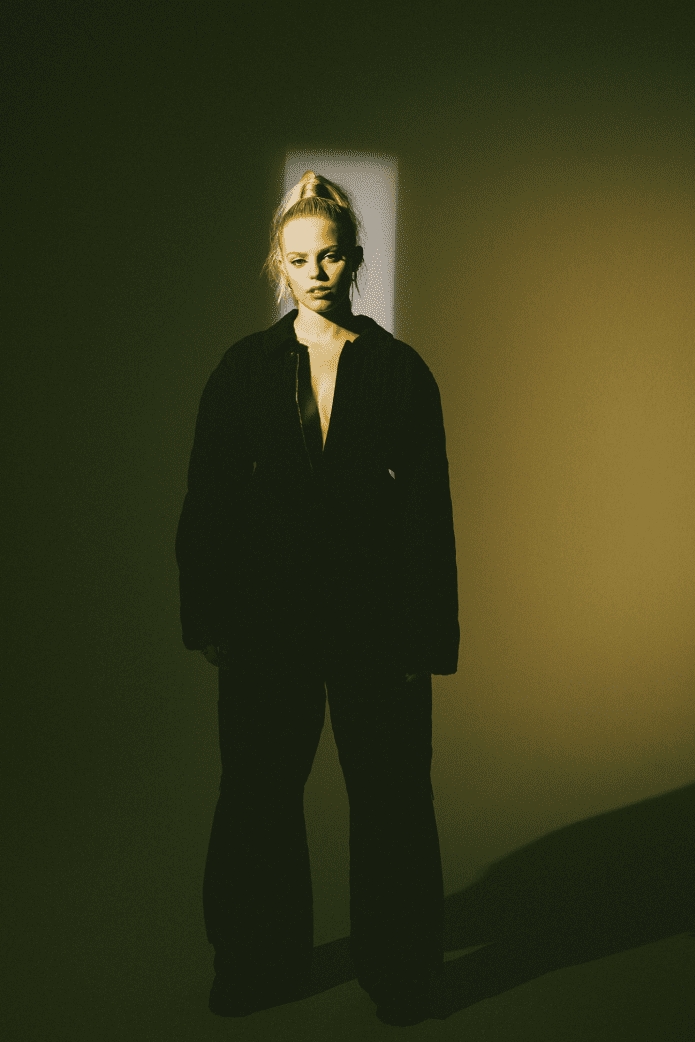
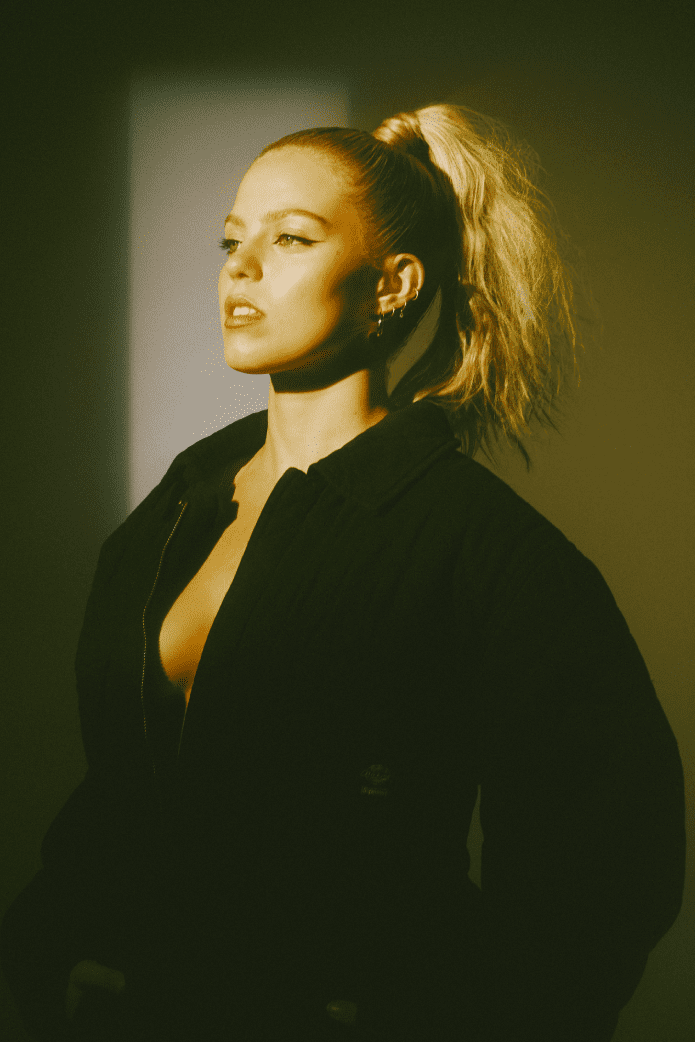
Rapp’s connection to her small, but mightly, discography has been a conscious decision. Her debut EP, Everything To Everyone, is a succinct, bite-size introduction to her cross-genre pop roots. “I listen mostly to R&B or indie-leaning stuff and Too Well was the song that I felt would perform the best, but it wasn’t the song that I loved the most,” she explains. “For me, I go based on lyrics — I’m such a lyric person. Too Well is a melody-based [and] works really well for pop and consumption, but I am a Colorado person through and through.”
And, soon enough, intimate lyrics became the personal thread pulling Rapp’s project together. In fact, sleeper hit What Can I Do has become one of the artist’s most full-hearted tracks to date. So, how did the painfully honest song come to light? Well, it took “a bunch of straight boys” which, in hindsight, Rapp calls “so f*cking weird”. Working alongside producers Blake Slatkin and Connor and Riley McDonough, the musician poured out her emotions as she began to pen her first openly LGBTQ+ song. “I’d actually never written a song about a girl or a non-heteronormative relationship that I’ve been in,” she admits. Despite the peculiar songwriting set-up, Rapp was grateful for the opportunity to express herself without any judgement. “[I felt like was] the antithesis of a gay woman. For that song, specifically, I needed to not feel any judgement about myself. And, for me, in a room with straight boys, I felt better than everyone! I genuinely felt like God in that room, which was good, because I needed to not be afraid.”
And, surprisingly, with Rapp’s unorthodox approach, the skeleton of What Can I Do began to emerge, which she earnestly credits to the straight energy in the room. “If I was in a room with queer people, I would have been nervous because I’d never written a queer song before,” she admits. “Also, at that time, I had been in a really long heteronormative relationship. I was so judgmental of myself. I would have felt the need to impress all of them because I think the world of them. I don’t think the same as these straight boys, because they just don’t get it. I could say whatever the f*ck I wanted and not judge myself. So, it was a total internal conflict.”
The songs on Everything to Everyone slow burn like unfurling movie credits against a cinema screen. There’s an intentional thoughtfulness behind Rapp’s minimalist tracklist. Early modulated vocals and soft-spoken ballads slip away into thick flickering pop beats, and brighter, fuller tunes. It’s a sure-fire rotation of headliner-ready choruses and gutsy one-liners that would feel at home on Taylor Swift’s Red. And, as songs like Don’t Tell My Mom roll around — it’s a reminder of how greatly Rapp feels. Her EP is rooted in feeling, but it’s not hopeless. Instead, it documents a queer coming-of-age that holds onto history, while Rapp readies herself for what comes next. “I still deal with [self-judgement] which really does suck, but it’s my own doing. I didn’t really recognise how much of the hateful shit I retained as a kid. I don’t really blame anybody else for it, though,” she says.
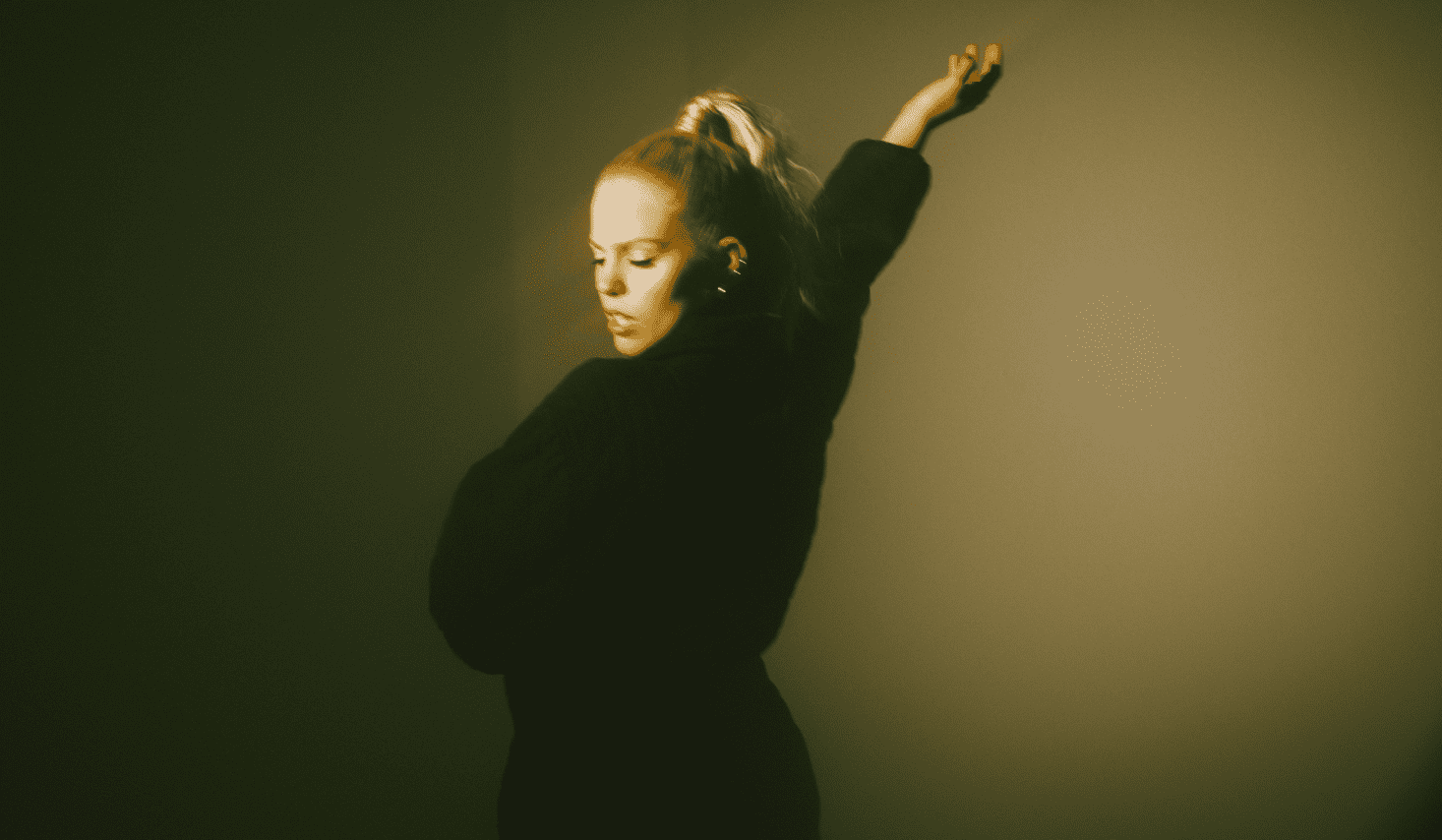
Raised in North Carolina, Rapp recalls the pivotal moments – between close family and friends – which shaped her shakey route to self-acceptance. Glancing aside, the singer draws up a memory of an older cousin who she vividly remembers being “shamed” for being gay. Rapp is quick to acknowledge the “fucked up” incidents she encountered as a teenager, revealing her own life greatly contrasts that of her on-screen character, Leighton Murray, in HBO’s The Sex Lives of College Girls. “My small coming out experiences were actually horrible. When I first came out to somebody in my family, they laughed at me and thought it was funny, so I didn’t take myself seriously,” she tells GAY TIMES. In a second shot at sharing her bisexuality, her two friends chalked up her coming out as nothing more than an attention grab. “I have washed my hands of that. I’m so incredibly grateful that I did. I spent a lot of time trying to explain myself to people who were never going to be receptive.”
Since then, the star has taken to surrounding herself with a healthier network of friends and has gradually begun working through her trauma. “I’m super lucky that I’m on this TV show and that I’m written as a character who is accepted, loved and not judged in that way,” she says. “Leighton’s a bitch which is why you judge her, but you don’t judge her because she’s gay. She’s celebrated because she’s gay, and that experience also has helped me immensely. Leighton made such a big difference in how I view myself. When we first filmed the show, I was having panic attacks nightly.”
As the audience following Sex Lives of College Girls continued to grow, so did Rapp’s confidence in her identity. Looking back on her audition days, the singer longed for the chance to “play a queer character” that aligned with who she was. And, so, when Leighton’s role came around and that big coming out scene dawned up on her, Rapp felt understandably nervous, but prepared to take it on. “I remember that was the one day on set where I was like I’m not acting at all. It was the best day,” she says. “We rehearsed it and I was entirely vulnerable. I didn’t think twice during that scene and it was the best experience I’ve ever had in a scene. It felt like coming out all over again. That was like my big coming out, really, and my life changed a lot.” After her small-screen break with Leighton, Rapp reveals those closest to her became “much more” understanding. “Everybody in my life is so receptive to me now, which, for a while I fucking hated it,” she laughs. “I got really mad like, ‘Fuck you guys! I’ve been gay since I was a kid.’ But, now I just really appreciate it.”
Now, older and with more experience since her Broadway days, Rapp is refusing to hold back on who she is. “I don’t fucking care! I do fuck up, but I don’t fucking care about navigating spaces that I used to care about when I was a kid, because I feel so empowered,” she crows proudly. “Being gay, but as a white woman, I really have a whole lot of power. I feel like a lot of people are like, gay white women are the most dangerous thing in the world and I fucking agree. I love it when I can use my [power] in a good way. I’m not afraid of what people say to me anymore.” And, partly in credit to her role of Leighton and to herself, Rapp is grateful for how far she has come. “Playing this character on College Girls made me so much more comfortable. Although, it scares the living shit out of me. Emotionally, I care so much about her. It feels like a responsibility, but in a good way. I really don’t want to fuck up. I care so much about the people that choose to surround themselves with her.”
Everything Reneé Rapp has achieved has primed her for this very moment — a triple upgraded solo show tomorrow. With only six months in the music game, Rapp feels like she’s finally hit the momentum she has been reaching for. “No one is ever going to believe in you as much as you need to believe in yourself, truly,” she resolutely. “I remember getting told by grown-ass men, ‘We just, like, don’t understand you.’ So, you don’t see it. I don’t give a fuck, I do — I’m going to force people to see it and I’ll find somebody who does. And, then, I did.”
Reneé Rapp’s new EP Everything To Everyone is out now via Polydor.
